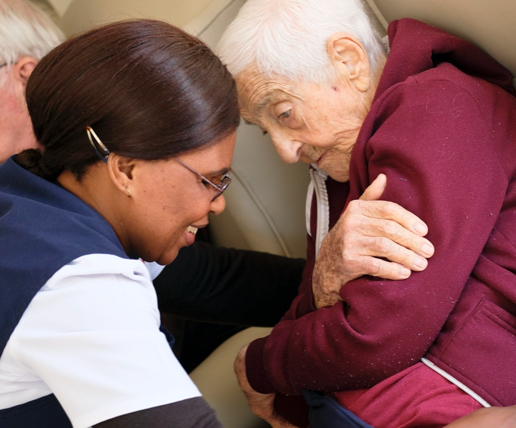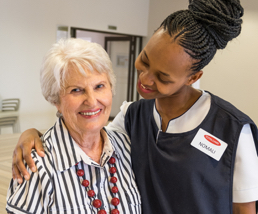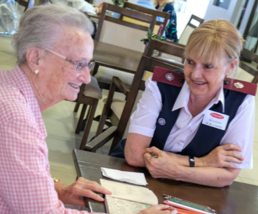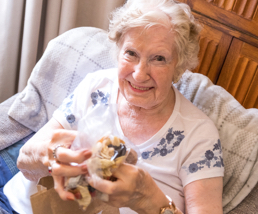



The stress of care giving for a spouse or loved one with dementia has also been shown to delay wound healing and shorten life that may be related to effects on inflammation.
Interleukin-6 (IL-6) is an important indicator of subclinical inflammation thought to contribute to degenerative diseases. When such caregivers were followed for six years, it was found that their average IL-6 levels increased four times more than controls matched for age, sex, health and socioeconomic status. Furthermore, this increased difference in IL-6 persisted for years after care giving activities ceased which could speed up the aging process and explain higher death rates.
In one study, senior citizens who felt stressed out from taking care of their disabled spouses were 63 percent more likely to die within 4 years than caregivers without this complaint. In another study that focused on telomere research, spouses and children who provided such constant care shortened their lives by as much as four to eight years!
Telomeres are areas of genetic material on the ends of a cell’s chromosomes that provide protection. As a cell divides, telomeres shorten and some of these genetic instructions are lost. An enzyme called telomerase normally prevents this, but as we grow older, our ability to make telomerase decreases, and the protective telomeres become shorter.
Thus, telomere length is a basic indicator of cellular aging and telomerase activity is a measure of cellular capacity for ongoing replication. Both of these were shown to be significantly reduced in these Alzheimer caregivers compared to controls. Caregivers also had double the rate of severe depression and prior research has shown that this can increase risk of death by as much as four times when compared with non-depressed controls.
Some of the early warning signs of caregiver stress are:
- feeling overwhelmed, lonely, guilty, sad or constantly worried
- feeling fatigued most of the time
- becoming easily irritated or angered
- lack of interest in activities you previously enjoyed
- significant change in weight or sleep habits
- frequent headaches, neck or low back pain
- abuse of alcohol or drugs
Some tips on how to reduce caregiver stress include:
- Identify what you can and cannot change. You may not be able to alter the way somebody else behaves but you can change the way that you react to it.
- Make a list of your top priorities and establish a daily routine.
- Set realistic goals by breaking large tasks into smaller ones that you can do individually when you have time.
- Don’t hesitate to ask for and to accept assistance and make a list of things that others could help with. Let them choose what is best for them, such as assisting with meals, shopping for groceries, relieving you for a few hours, or taking the patient for a walk once or twice a week.
- Try to lighten your load by learning about care giving resources such as meal delivery, home health care services (nursing, physical therapy), non medical assistance (housekeeping, cooking, companionship) or home modification changes that make it easier for patients to bathe, use the toilet or move around.
- If you need financial help taking care of a relative, don’t be afraid to ask family members to contribute their fair share.
- Stay in touch with family and friends but say “no” to requests that you no longer can easily handle, such as hosting holiday meals.
If your loved one is not bedridden and does not have dementia, there are emergency response systems (button on a necklace, bracelet or belt that they wear) that can alert medical personnel and you. You can use an intercom system to hear someone in another room, or a Webcam video camera that can see them. Don’t automatically assume that any new symptoms or an increase in previous ones are automatically due to stress and always consult a physician in such instances. People who take an active, problem-solving approach to any care giving issue are much less likely to feel stressed than those who react by worrying or feeling helpless.
Whilst every effort is taken to avoid errors, the company cannot accept responsibility for the accuracy of any statement, extract or information contained within the sections of this product and or service, nor can any of its contributors who have submitted material for inclusion. The company may update this product and or service and anything described in it without notice. Errors and omissions excepted (E&OE).
Because the immune system’s defence mechanisms become impaired as we grow older, our ability to resist infection progressively declines. So does our ability to respond effectively to other causes of inflammation that have been implicated in age related atherosclerosis, osteoporosis, arthritis, Type 2 diabetes, cancers and dementia.



Chronic stress is widely believed to accelerate biologic aging and support comes from studies confirming its adverse effects on immune system function, as well as how we respond to hidden inflammation. Stress significantly reduces the immune response to influenza and pneumococcal vaccine in the elderly, and to hepatitis B vaccine in younger individuals.
The stress of care giving for a spouse or loved one with dementia has also been shown to delay wound healing and shorten life that may be related to effects on inflammation.
Interleukin-6 (IL-6) is an important indicator of subclinical inflammation thought to contribute to degenerative diseases. When such caregivers were followed for six years, it was found that their average IL-6 levels increased four times more than controls matched for age, sex, health and socioeconomic status. Furthermore, this increased difference in IL-6 persisted for years after care giving activities ceased which could speed up the aging process and explain higher death rates.
In one study, senior citizens who felt stressed out from taking care of their disabled spouses were 63 percent more likely to die within 4 years than caregivers without this complaint. In another study that focused on telomere research, spouses and children who provided such constant care shortened their lives by as much as four to eight years!
Telomeres are areas of genetic material on the ends of a cell’s chromosomes that provide protection. As a cell divides, telomeres shorten and some of these genetic instructions are lost. An enzyme called telomerase normally prevents this, but as we grow older, our ability to make telomerase decreases, and the protective telomeres become shorter.
Thus, telomere length is a basic indicator of cellular aging and telomerase activity is a measure of cellular capacity for ongoing replication. Both of these were shown to be significantly reduced in these Alzheimer caregivers compared to controls. Caregivers also had double the rate of severe depression and prior research has shown that this can increase risk of death by as much as four times when compared with non-depressed controls.
Some of the early warning signs of caregiver stress are:
- feeling overwhelmed, lonely, guilty, sad or constantly worried
- feeling fatigued most of the time
- becoming easily irritated or angered
- lack of interest in activities you previously enjoyed
- significant change in weight or sleep habits
- frequent headaches, neck or low back pain
- abuse of alcohol or drugs
.
- Identify what you can and cannot change. You may not be able to alter the way somebody else behaves but you can change the way that you react to it.
- Make a list of your top priorities and establish a daily routine.
- Set realistic goals by breaking large tasks into smaller ones that you can do individually when you have time.
- Don’t hesitate to ask for and to accept assistance and make a list of things that others could help with. Let them choose what is best for them, such as assisting with meals, shopping for groceries, relieving you for a few hours, or taking the patient for a walk once or twice a week.
- Try to lighten your load by learning about care giving resources such as meal delivery, home health care services (nursing, physical therapy), non medical assistance (housekeeping, cooking, companionship) or home modification changes that make it easier for patients to bathe, use the toilet or move around.
- If you need financial help taking care of a relative, don’t be afraid to ask family members to contribute their fair share.
- Stay in touch with family and friends but say “no” to requests that you no longer can easily handle, such as hosting holiday meals.
- Social support is a powerful stress buster, and in addition to family and friends, there may be a support group for caregivers in your situation. Joining may allow you to make new friends and also pick up useful tips from others who have had similar problems.
- Try to find time to be physically active as much as possible, get enough sleep and eat properly.
- Make time each week to do something that you enjoy and can look forward to, such as shopping or seeing a movie.
- If your loved one is not bedridden and does not have dementia, there are emergency response systems (button on a necklace, bracelet or belt that they wear) that can alert medical personnel and you. You can use an intercom system to hear someone in another room, or a Webcam video camera that can see them.
- Don’t automatically assume that any new symptoms or an increase in previous ones are automatically due to stress and always consult a physician in such instances. People who take an active, problem-solving approach to any care giving issue are much less likely to feel stressed than those who react by worrying or feeling helpless.
